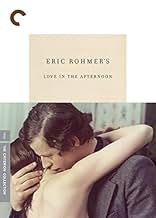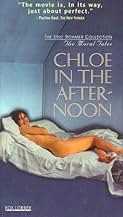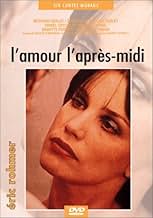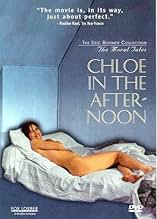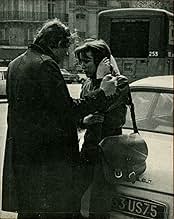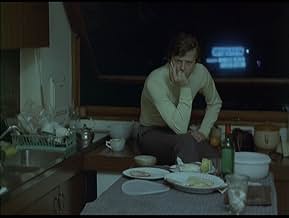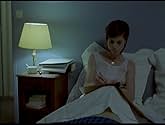Obwohl er eine verehrende Frau hat, ist ein bürgerlicher Mann immer noch versucht, andere Frauen zu verfolgen.Obwohl er eine verehrende Frau hat, ist ein bürgerlicher Mann immer noch versucht, andere Frauen zu verfolgen.Obwohl er eine verehrende Frau hat, ist ein bürgerlicher Mann immer noch versucht, andere Frauen zu verfolgen.
- Auszeichnungen
- 1 wins total
- Martine
- (as Babette Ferrier)
Empfohlene Bewertungen
All of the "Six Moral Tales" provide the viewer with a cast of excellent and memorable characters. Even if these characters aren't always the most likable (just look at the film "La collectionneuse"), they are always very interesting to watch. I believe that the characters in "Chloe in the Afternoon" may be the greatest characters in the "Six Moral Tales" series. Especially the character of Chloe, a very smart and likable character who offers a lot of the film's greatest and most interesting dialogue (great dialogue is another feature that is all over this film series).
Another thing that I found highly impressive about the way her character was written was how she is given a clear back story, but, instead of her back story being forcefully told to the audience in detail all at once it is simply glanced over. It is perhaps the least forced back story given to a character in any other film that I've seen.
The film also turns out to be the most emotional of the "Six Moral Tales", with a truly compelling ending sequence. You can tell that director Eric Rohmer's films really began to mature since the earliest of the "Moral Tales", the 1962 short film "The Bakery Girl of Monceau".
While it isn't the best of the "Six Moral Tales", and it was kind of slow at times, it is a perfectly fitting ending to one of the greatest of all film series!
When Chloe (Zouzou), a free-spirited friend he used to know shows up, Frederic finds a release in her companionship and is able to confide in her in a way that he is unable to do with his wife. They spend afternoons together talking about love and relationships. She confesses that she doesn't want to be married but would like to have a child, particularly one with Frederic. The central tension of the film is the choice Frederic must make between his passion for Chloe and his love for his wife. Although he is tempted to have an affair with Chloe, he spends too much time pondering the pros and cons and doesn't act. Chloe on the other hand is in love with Frederic and has a come-what-may attitude toward his entanglements.
Like Jerome (Claire's Knee) and Jean-Louis (My Night at Maud's), Frederic is weak and indecisive and is forever attempting to justify his inability to choose. He stands on the edge of temptation but is never quite ready to jump. Rohmer does not, however, make any moral judgments but hints that Frederic's temptation and pangs of conscience are something most of us go through at some time in our lives.
Though there is a lot of talking in Chloe in the Afternoon, it never seems false or tiresome. This is a very charming film that Pauline Kael called "in every respects, a perfect film". It has a natural rhythm with characters that are so real that you don't want to leave them when the film ends. As Frederic's ultimate choice looms, we are privy to some sharp and insightful dialogue that illuminates the complexity of relationships. The story is told from the husband's point of view and we are left wondering how different it would be if told by his wife. Her tears at the end provide a clue.
I was particularly taken with the scene on the train when Frederic begins to explain how he is able to remain under control in the presence of so many beautiful women in the world. Simply acknowledging such beautiful creatures seems to be enough for this man, yet when Chloe arrives on the scene we begin to wonder if Frederic will fold under pressure.
I can surely identify with what Frederic feels on the train. It happens to all of us -- we are faced with beauty, and we must respond. How we respond is what makes life worth living.
Wusstest du schon
- WissenswertesThis film is part of the Criterion Collection, spine #348.
- PatzerAt approximately 1:16 in the film, Chloe opens the store door wearing red shoes matching her dress. In the following scene, she walks down a staircase wearing black shoes which match her stockings.
- Zitate
Frédéric: [voice over] That's why I love the city. People come into view, then vanish. You don't see them grow old. What makes the streets of Paris so fascinating is the constant yet fleeting presence of women whom I'm almost certain never to see again. It's enough that they're there, indifferent, conscious of their charm, happy to test its affect on me, as I test mine on them, by tacit agreement, without even the subtlest smile or glance. I feel their seductive power without giving in to it. This doesn't estrange me from Hélène. Far from it. I tell myself these passing beauties are simply an extension of my wife's beauty. They enrich her beauty and receive some of hers in return. She's the guarantee of the world's beauty and vice versa. When I embrace Hélène, I embrace all women.
- VerbindungenFollows Die Bäckerin von Monceau (1963)
Top-Auswahl
Details
Box Office
- Weltweiter Bruttoertrag
- 3.520 $
- Laufzeit
- 1 Std. 37 Min.(97 min)
- Sound-Mix
- Seitenverhältnis
- 1.37 : 1

![Bande-annonce [OV] ansehen](https://m.media-amazon.com/images/M/MV5BNDVkYjA1MTItYWFjMi00ZTQ3LTg2NGQtZmZhOTg4MjU1MTg4XkEyXkFqcGdeQXRyYW5zY29kZS13b3JrZmxvdw@@._V1_QL75_UY281_CR5)
